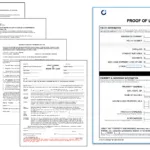Filing a homeowners or property insurance claim can be frustrating. Jumping into a claims process and dealing with insurance companies, adjusters, contractors, or attorneys immediately after your property is damaged can be a headache. Having your property damaged is already frustrating, and making an insurance claim and following it through to payment can be tedious. It’s not something you do every day, and it’s subject to nuanced and hard to understand state laws and regulations, as well as complicated policy terms. The good news, through, is that Pennsylvania has protections for policyholders built into the insurance law, and the insurance regulations provide strict deadlines and requirements for the investigation and payment of property insurance claims. If policyholders are aware of these deadlines and rules, and are proactive with respect to their claims, they should have a smooth, fast, efficient, and fair insurance claim process.
These resources are built to help policyholders — and all the stakeholders who work with them, like adjusters, attorneys, contractors, and consultants. These resources will help you file your claim correctly, document your losses thoroughly, and know when and how to followup through the claim process. And, if necessary, how and when to escalate and resolve the claim.
Claim Filing Deadline
Reasonable time – set by policy
The “standard” policy in Pennsylvania requires the policyholder to provide “immediate written notice” of the loss to the insurance company, but the actual meaning of “immediate” or “prompt” or “reasonable” with respect to making a claim can depend on the circumstances.
Initial Response Time
10 working days
Pennsylvania requires insurance companies to acknowledge property insurance claims within 10 working days after receiving notification of the claim unless payment is made within that time period.
Claim Decision Time
15 days
Pennsylvania requires that an insurance company accept or deny a claim within 15 days of receipt of a properly executed proof of loss. Note, however, that the investigation can be extended as long as written reasons are provided.
Lawsuit Deadline
1 year
Pennsylvania allows insurance companies to shorten the statute of limitations with respect to filing a lawsuit to 1 year after the date of loss or damage, so accordingly, almost all policies do so.
State Department
Pennsylvania Department of Insurance
Pennsylvania Insurance Department
1326 Strawberry Square
Harrisburg, PA 17120
Pennsylvania Insurance Department
Contact Form
File your Claim Now with ClaimSpot
ClaimSpot guides you through a quick, secure, and effortless filing experience.
It’s free. Let ClaimSpot Make Your Claim Fast & Easy.
Pennsylvania Insurance Claim Guide
Filing: Pennsylvania Insurance Claim FAQs
All insurance claims start by informing your insurance company of the loss. You want to do this as soon as possible. There are many ways to notify the insurance company. It’s most important that you keep a record of notifying them. Here are frequently asked questions about how to best “file your claim” with the insurance company in Pennsylvania and the state regulations that will help (or hurt) you!
In order to initiate a claim under a property insurance policy in Pennsylvania, the policyholder must inform their insurance carrier of the loss (either directly or through their agent), and that they are making a claim. This means that the only requirements to initiate the process is that the insurance carrier is informed that there has been a loss, some details about the loss, and that the policyholder wants to make a claim.
In many cases, an insurance company will call this communication a first notice of loss, or FNOL. In Pennsylvania, insurance laws call this communication a “notification of claim.” A Notification of Claim in Pennsylvania is specifically defined as: “[a] notification, whether in writing or other means acceptable under the terms of an insurance policy or insurance contract, to an insurer or its agent, by a claimant or insured, which reasonably apprises the insurer of the facts pertinent to a claim.”
Most insurance companies provide multiple ways to contact them after a loss to begin the claims process, these usually include:
a. Phone call (a number is usually provided on the insurance company’s website);
b. Online portal – many insurance companies have an online form to notify the claims department of a loss, this may even be through a mobile app;
c. Your agent – many insurance companies even have a different section of their website or phone number for an agent to inform them of a policy-holder’s loss;
d. Online software as a virtual assistant.
While it is easy and quick to start a claim, claimants need to continue to follow-up and provide more information. In many cases, the insurer will require more information and supporting documentation, including specific forms, to actually process and adjust the claim. These specific necessary forms should be provided to the claimant by the insurance company.
1. Promptly inform your insurance carrier of the loss (see above);
2. As soon as possible begin to mitigate the damage – protect the property and secure it against further damage as soon as it is safe and possible to do so.
3. Cooperate with your insurance company and communicate with them (and keep copies of all correspondence).
4. Make your property available for inspection as soon as it is safe and possible to do so.
5. Prepare supporting documents for your claim including:
– Inventory list;
– Description of damages;
– Photographs and/or videos of the damage;
– Receipts; etc.
Reporting Deadline: Pennsylvania insurance law does not set forth any specific deadline for making a property insurance claim. This means that the deadline for informing the insurer of a claim is set by the policy itself. It is important to be familiar with the insurance policy so that deadlines are not missed. The “standard” policy in Pennsylvania requires the policyholder to provide “immediate written notice” of the loss to the insurance company, and to “protect the property from further damage, forthwith separate the damaged and undamaged personal property, put it in the best possible order, and furnish a complete inventory of the destroyed, damaged, and undamaged property, showing in detail quantities, costs, actual cash value, and amount of loss claimed.”
It is always best practice to inform an insurance company of the losses sustained and that a claim is being made as soon as it is reasonably possible to do so after the damage is incurred and a determination that a claim will be filed is made. While it is never a good idea to delay in providing the insurance company with information once it has been determined that a claim will be filed, the actual meaning of “immediate” or “prompt” or “reasonable” with respect to making a claim depends on the circumstances – if a home is completely destroyed by a storm and the phones, internet, and power are off, it may take a little longer to make the claim.
Be sure to check the language of the insurance policy to determine the notification or reporting deadlines. But, in any event, remember that best practice is to provide notice of the loss and claim to the insurer as soon as possible.
Followup: Document Your Pennsylvania Insurance Claim FAQs
Notifying the insurance company about a loss is just the first step. The most important work comes next: documenting your loss and following up with the carrier. Pennsylvania has enacted many regulations to guarantee that the insurance company acts moves promptly and fairly to investigate and pay your claim…but you need to understand these regulations and know the appropriate timeframes. That means communicating with the insurance company early and often and putting them on the clock. These FAQs will let you know the applicable standards.
Documentation Deadline: Pennsylvania does not set a specific deadline to provide support for a claim by statute, but instead allows this timeline to be set by the policy itself. The standard Pennsylvania property insurance policy requires that a proof of loss document be provided within 60 days of when the loss occurred, so many policies use this language.
In any event, however, the deadline for submitting a proof of loss may be extended by agreement between the parties if circumstances make it difficult or impossible for the policyholder to comply with the deadline as set forth by the policy. It is also not allowed for an insurance company to delay in the processing or payment of a claim by requiring a policyholder to “submit a preliminary claim report and then requiring the subsequent submission of formal proof‑of‑loss forms, both of which submissions contain substantially the same information.” The standard policy proof of loss requirements need substantial information to be provided, so getting started quickly is crucial.
Note, however, that no matter the actual deadline for providing supporting documentation, it is always best practice to provide a proof of loss document and support of the claim as soon as possible (while noting that the document only presents the knowledge at the time and may be amended or updated). Getting a properly completed proof of loss to the insurance company quickly is a good way to get the claim process moving along, and to facilitate payment. Some deadline for Pennsylvania insurers start to run from receipt of a sufficient proof of loss, so it’s a good idea to provide one as soon as reasonably possible.
Pennsylvania has adopted laws governing unfair claims settlement practices to protect policyholders and to provide a streamlined timeline for claims to be handled, and these laws provide deadlines for the acknowledgment and processing of claims.
Deadlines for Acknowledgment: Pennsylvania requires insurance companies to acknowledge property insurance claims within 10 working days after receiving notification of the claim unless payment is made within that time period.
Further, Pennsylvania requires insurers to provide all “necessary claim forms, instructions and reasonable assistance so that [policyholders] can comply with the policy conditions and reasonable requirements of the insurer” within the same 10-working-day period. Compliance with this requirement constitutes compliance with the requirement to “acknowledge” the claim.
Deadlines for Investigation: Pennsylvania doesn’t really provide a specific breakdown of the time to begin an investigation of the claim, other than by inference of when an investigation of a claim is supposed to be completed. Pennsylvania specifies that insurers are to “complete investigation of a claim within 30 days after notification of claim”, but that deadline can be extended. Despite any extensions, though, Pennsylvania law does require that insurance companies “adopt and implement reasonable standards for the prompt investigation and settlement of claims.”
Pennsylvania requires insurers to “acknowledge and act promptly upon written or oral communications with respect to claims.” Specifically, “[a]n appropriate reply shall be made within 10 working days on other pertinent communications from a claimant which reasonably suggest that a response is expected.”
Resolving: Get Paid & Protect Your Rights On Pennsylvania Insurance Claim FAQs
Ultimately, the insurance claim must be approved and paid (or, unfortunately, denied). Getting to this step and getting the money has a lot of logistics…and that is if everything goes well. If all or any portion of the claim is debated (which is really common) then you need to escalate it. In either event, Alabama has regulations governing these timelines to guide the way. These FAQs show what is supposed to happen.
Deadline for Acceptance/Denial: Pennsylvania requires that an insurance company accept or deny a claim within 15 days of receipt of a properly executed proof of loss.
Note, however, that while the investigation is supposed to be complete within 30 days of receipt of notification of claim, and the deadline for acceptance or denial of a claim is within 15 days of a properly executed proof of loss (which is generally due 60 days from when requested by the insurer) these deadlines can be pushed out by the insurer if additional time is needed to complete the investigation in order to determine whether the claim will be accepted or denied. If that is the case, the insurer must notify the policyholder within the 30-day period of the investigation (and within every 45 days thereafter that the claim investigation remains ongoing) and give an explanation of why more time is needed, and an estimate of when a decision on the claim may be expected.
Deadline for Payment: Pennsylvania doesn’t really provide a specific breakdown of the time to begin an investigation of the claim. However, Pennsylvania law does require that insurance companies “adopt and implement reasonable standards for the prompt investigation and settlement of claims.” Further, the standard policy in Pennsylvania specifies that payment is generally due 60 days after sufficient proof of loss is received by the insurer.
If an insurance company is determined to be in violation of the unfair claims settlement practices requirements, the insurer is subject to penalties. While the unfair trade practices requirements do not create a private right of action (the ability for a policyholder to sue the insurance company directly for breach) the policyholder can complain to the state insurance department and the insurer can be penalized.
Additionally, insurers have a requirement to act in good faith in investigating and settling the claim. A policyholder may file suit a breach of contract action against the insurer if they believe the insurer has acted in bad faith. In order to establish an insurer’s bad faith the claimant must show:
(1) The insurer did not have a reasonable basis for denying policy benefits;
(2) The insurer knew or recklessly disregarded its lack of reasonable basis in denying the claim.
While the action for insurance bad faith in Pennsylvania is a breach of contract action, Pennsylvania statutes grants courts the authority to provide tort-like damages for these types of claims. If an insurer is liable for a bad faith refusal to pay a valid claim, the court is empowered to take any and all of the following actions:
(1) Award interest on the amount of the claim from the date the claim was made by the insured in an amount equal to the prime rate of interest plus 3%.
(2) Award punitive damages against the insurer.
(3) Assess court costs and attorney fees against the insurer.












